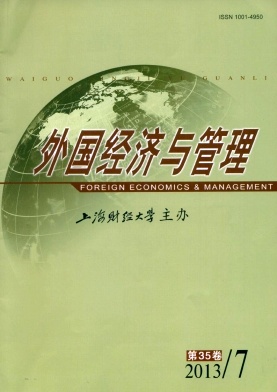国际并购逆向知识转移影响因素研究述评与展望
外国经济与管理 2013 年 第 35 卷第 07 期, 页码:12 - 22
摘要
参考文献
摘要
国际并购逆向知识转移现已成为MNC知识转移研究的一个新热点。本文先界定了国际并购逆向知识转移的内涵,然后从并购双方外部环境、主体动机与特征、关系质量等方面,对现有的国际并购逆向知识转移影响因素研究进行了系统的梳理和述评,并在此基础上提出了一个整合研究框架,最后指出了未来可能的研究方向。
[1]Ambos T C,et al.Learning from foreign subsidiaries:An empirical investigation of headquarters’benefits from reverse knowledge transfer[J].International Business Review,2006,15(3):294-312.
[2]Birkinshaw J,et al.Knowledge transfer in international ac-quisitions:A retrospective[J].Journal of International Busi-ness Studies,2010,41(1):21-26.
[3]Bjrkman I,et al.Cultural differences and capability transfer in cross-border acquisitions:The mediating roles of capability complementarity,absorptive capacity,and social integration[J].Journal of International Business Studies,2007,38(4):658-672.
[4]Bresman H,et al.Knowledge transfer in international acqui-sitions[J].Journal of International Business Studies,1999,30(3):439-462.
[5]Casal C C and Fontela E N.Transfer of socially complex knowledge in mergers and acquisitions[J].Journal of know-ledge Management,2007,11(4):58-71.
[6]Castro C and Neira E.Knowledge transfer:Analysis of three Internet acquisitions[J].International Journal of Human Re-source Management,2006,16(1):120-135.
[7]Empson L.Fear of exploitation and fear of contamination:Impediments to knowledge transfer in mergers between pro-fessional service firms[J].Human Relations,2001,54(7):839-862.
[8]Frost T S and Zhou C.Centrifugal forces,R&D co-practice,and reverse knowledge flows’in multinational firms[R].AIB Annual Meeting,Monterey,California,2003.
[9]Girma S.Technology transfer from acquisition FDI and the absorptive capacity of domestic firms:An empirical investiga-tion[J].Open Economies Review,2005,16(1):175-187.
[10]Glaister K W and Ahammad M.Knowledge transfer and cross border acquisition performance:The impact of cultural distance and employee retention[R/OL].http://papers.ss-rn.com/sol3/papers.cfm?abstract_id=1544934,January 30,2010.
[11]Hakanson L and Nobel R.Technology characteristics and reverse technology transfer[J].Management International Review,2000,40(1):29-48.
[12]Hakanson L,et al.Organization characteristics and reverse knowledge transfer[J].Management International Review,2001,41(4):392-420.
[13]Huysman M and Leonard D.Towards a learning perspective on knowledge/technology transfer through corporate acquisi-tions[R].Proceedings of the35th Hawaii International Con-ference on System Sciences,2002.
[14]Jun H J,et al.Key success factors in knowledge transfer during M&A in traditional industries:An empirical study[J].Journal of International Technology and Information Manage-ment,2010,19(14):109-131.
[15]Junni P.Knowledge transfer in acquisitions:Fear of exploitation and contamination[J].Scandinavian Journal of Management,2011,27(3):307-321.
[16]Larsson R and Lubatkin M.Achieving acculturation in mer-gers and acquisitions:An international case survey[J].Hu-man Relations,2001,54(12):1573-1607.
[17]Riad S.The power of organizational culture’as a discursive formation in merger integration[J].Organization Studies,2005,26(10):1529-1554.
[18]Sarala R M and Vaara E.Cultural differences,convergence,and crossvergence as explanations of knowledge transfer in in-ternational acquisitions[J].Journal of International Business Studies,2010,41(8):1365-1390.
[19]Schoenberg R.Knowledge transfer and resource sharing as value creation mechanisms in inbound continental European acquisitions[J].Journal of Euromarketing,2001,10(1):99-114.
[20]Simonin B L andzsomer A.Knowledge processes and learning outcomes in MNCs:An empirical investigation of the role of HRM practices in foreign subsidiaries[J].Human Re-source Management,2009,48(7):505-530.
[21]Stahl G K and Voigt A.Do cultural differences matter in mergers and acquisitions?A tentative model and examination[J].Organization Science,2008,19(1):160-176.
[22]Teerikangas S and Very P.The culture-performance rela-tionship in M&A:From yes/no to how[J].British Journal of Management,2006,17(1):31-48.
[23]ThucAnh P T,et al.Knowledge acquisition from foreign parents in international joint ventures:An empirical study in Vietnam[J].International Business Review,2006,15(2):463-487.
[24]Westphal T G and Shaw V.Knowledge transfers in acquisi-tions—An exploratory study and model[J].Management In-ternational Review,2005,45(2):75-100.
[25]Yang Q,et al.Conventional and reverse knowledge flows in multinational corporations[J].Journal of Management,2008,34(5):882-902.
[26]和金生,陈国绪.海外子公司反向知识转移研究[J].现代财经,2006,(11):3-7.
[27]刘明霞.中国MNC逆向知识转移研究[M].北京:中国社会科学出版社,2012.
[28]王超,朱顺林.中国海外收购型子公司反向知识转移影响因素研究[J].企业活力,2010,(7):49-53.
[29]吴晓云,陈怀超.基于制度距离的MNC知识转移研究[J].经济问题探索,2011,(9):17-23.
[30]易凌峰,侯英姿.MNC外派的组织学习机制模型:基于逆向知识转移视角[J].华东师范大学学报(哲学社会科学版),2010,(6):93-97.
[2]Birkinshaw J,et al.Knowledge transfer in international ac-quisitions:A retrospective[J].Journal of International Busi-ness Studies,2010,41(1):21-26.
[3]Bjrkman I,et al.Cultural differences and capability transfer in cross-border acquisitions:The mediating roles of capability complementarity,absorptive capacity,and social integration[J].Journal of International Business Studies,2007,38(4):658-672.
[4]Bresman H,et al.Knowledge transfer in international acqui-sitions[J].Journal of International Business Studies,1999,30(3):439-462.
[5]Casal C C and Fontela E N.Transfer of socially complex knowledge in mergers and acquisitions[J].Journal of know-ledge Management,2007,11(4):58-71.
[6]Castro C and Neira E.Knowledge transfer:Analysis of three Internet acquisitions[J].International Journal of Human Re-source Management,2006,16(1):120-135.
[7]Empson L.Fear of exploitation and fear of contamination:Impediments to knowledge transfer in mergers between pro-fessional service firms[J].Human Relations,2001,54(7):839-862.
[8]Frost T S and Zhou C.Centrifugal forces,R&D co-practice,and reverse knowledge flows’in multinational firms[R].AIB Annual Meeting,Monterey,California,2003.
[9]Girma S.Technology transfer from acquisition FDI and the absorptive capacity of domestic firms:An empirical investiga-tion[J].Open Economies Review,2005,16(1):175-187.
[10]Glaister K W and Ahammad M.Knowledge transfer and cross border acquisition performance:The impact of cultural distance and employee retention[R/OL].http://papers.ss-rn.com/sol3/papers.cfm?abstract_id=1544934,January 30,2010.
[11]Hakanson L and Nobel R.Technology characteristics and reverse technology transfer[J].Management International Review,2000,40(1):29-48.
[12]Hakanson L,et al.Organization characteristics and reverse knowledge transfer[J].Management International Review,2001,41(4):392-420.
[13]Huysman M and Leonard D.Towards a learning perspective on knowledge/technology transfer through corporate acquisi-tions[R].Proceedings of the35th Hawaii International Con-ference on System Sciences,2002.
[14]Jun H J,et al.Key success factors in knowledge transfer during M&A in traditional industries:An empirical study[J].Journal of International Technology and Information Manage-ment,2010,19(14):109-131.
[15]Junni P.Knowledge transfer in acquisitions:Fear of exploitation and contamination[J].Scandinavian Journal of Management,2011,27(3):307-321.
[16]Larsson R and Lubatkin M.Achieving acculturation in mer-gers and acquisitions:An international case survey[J].Hu-man Relations,2001,54(12):1573-1607.
[17]Riad S.The power of organizational culture’as a discursive formation in merger integration[J].Organization Studies,2005,26(10):1529-1554.
[18]Sarala R M and Vaara E.Cultural differences,convergence,and crossvergence as explanations of knowledge transfer in in-ternational acquisitions[J].Journal of International Business Studies,2010,41(8):1365-1390.
[19]Schoenberg R.Knowledge transfer and resource sharing as value creation mechanisms in inbound continental European acquisitions[J].Journal of Euromarketing,2001,10(1):99-114.
[20]Simonin B L andzsomer A.Knowledge processes and learning outcomes in MNCs:An empirical investigation of the role of HRM practices in foreign subsidiaries[J].Human Re-source Management,2009,48(7):505-530.
[21]Stahl G K and Voigt A.Do cultural differences matter in mergers and acquisitions?A tentative model and examination[J].Organization Science,2008,19(1):160-176.
[22]Teerikangas S and Very P.The culture-performance rela-tionship in M&A:From yes/no to how[J].British Journal of Management,2006,17(1):31-48.
[23]ThucAnh P T,et al.Knowledge acquisition from foreign parents in international joint ventures:An empirical study in Vietnam[J].International Business Review,2006,15(2):463-487.
[24]Westphal T G and Shaw V.Knowledge transfers in acquisi-tions—An exploratory study and model[J].Management In-ternational Review,2005,45(2):75-100.
[25]Yang Q,et al.Conventional and reverse knowledge flows in multinational corporations[J].Journal of Management,2008,34(5):882-902.
[26]和金生,陈国绪.海外子公司反向知识转移研究[J].现代财经,2006,(11):3-7.
[27]刘明霞.中国MNC逆向知识转移研究[M].北京:中国社会科学出版社,2012.
[28]王超,朱顺林.中国海外收购型子公司反向知识转移影响因素研究[J].企业活力,2010,(7):49-53.
[29]吴晓云,陈怀超.基于制度距离的MNC知识转移研究[J].经济问题探索,2011,(9):17-23.
[30]易凌峰,侯英姿.MNC外派的组织学习机制模型:基于逆向知识转移视角[J].华东师范大学学报(哲学社会科学版),2010,(6):93-97.
引用本文
易加斌, 张曦. 国际并购逆向知识转移影响因素研究述评与展望[J]. 外国经济与管理, 2013, 35(7): 12–22.
导出参考文献,格式为:





 7481
7481  846
846

